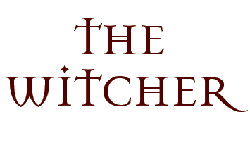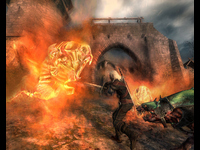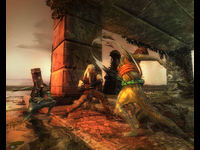|
|

|
PLATFORM
|
Windows
|
BATTLE SYSTEM
|

|
INTERACTION
|

|
ORIGINALITY
|

|
STORY
|

|
MUSIC & SOUND
|

|
VISUALS
|

|
CHALLENGE
|
Easy to Moderate
|
COMPLETION TIME
|
40-60 hours
|
|
OVERALL

|
Click here for scoring definitions
|
|
|
The Witcher is the tale of Geralt of Rivia, a Witcher by trade. Witchers are monster hunters that are strong in both body and mind. Not only are they masters of blade and magic, they can also brew different alchemical potions that are used to boost their natural abilities. And most importantly, they also like to sleep around.
Those that play the game will notice right away that the world is not a happy one. Wherever Geralt goes, death and suffering follow. Wars occur, bandits roam the streets, and monsters lurk around every corner. Geralt is an amnesiac, and he must travel the world as a novice while meeting people he previously knew to unlock his memories. Throughout this process he must also solve a problem put forth at the beginning of the game: who attacked the Witcher fortress and stole their alchemical equipment and notes? In fact, this mission will keep Geralt busy throughout the entire game.
As in any good RPG, The Witcher is chock full of side quests. In fact, some chapters have so many side quests that they outnumber main quests five to one. This large selection of optional content gives the player plenty of opportunities to power up Geralt and explore more of the game world. The player can also choose to figure out how to sleep with every single woman in the game world... well almost every one of them! A downside is that there is always way too much to do at the beginning of new chapters, often leaving the player paralyzed while figuring out what to do. Not knowing the way around can lead the player to waste hours upon hours backtracking.
The story itself keeps the player going from start to finish. As is common with PC RPGs, The Witcher employs a player-guided storytelling method. For every goal in the game, there may be one, two, or even more possible solutions. These aren't the typical good and evil choices; they range in various degrees between the two sides of the spectrum. Even more important is that even choices made in the first chapter can affect what happens later in the story. For example, what appeared to be a good choice initially can result in irreparable harm later on when the full consequences are revealed. It is just as the ads say: "There is no good or evil--only consequences to your actions." The splitting storylines can lead the player to replay the game at least once more after finishing it to see what would have happened had they made different choices.
 It's getting hot in here!
It's getting hot in here!
|
|
Geralt is a master of the blade and magic. He employs a pair of swords: one of steel and one of silver. The silver sword is used against mythical beings and monsters, while the steel sword is meant to slay humans and natural beasts. Each has three styles: power, speed and group. The power style trades finesse for raw striking force and is good for hitting heavily armored or slow opponents. The speed style is useful to take down speedy opponents, while the group style is perfect for clearing out groups of weaker enemies. It is very important to match up the weapon and style to the enemies that the player is fighting--to not do so may lead to a quick death. Magic spells, or Witcher signs as they are called, must be found before they can be used. They are essential for success on the higher difficulty levels.
The alchemy system in The Witcher is simple compared to what is found in other games. The player first needs to find the recipe for the potion, poison, or oil that they wish to create. With that in hand, they can see what ingredients they need. Monsters can be harvested, plants can be picked, and various items can be bought in stores for use in alchemy. Each ingredient has certain base components, which there may be more than one of. The player can then choose which ingredients to create the potions with (hopefully taking in consideration the rarity of the ingredients). On higher difficulty levels, a clear understanding of what is needed is essential to save time while harvesting for materials.
There are three difficulty levels in The Witcher. Harder settings make monsters more powerful and Geralt levels up slower. On the easiest mode, the game offers the player a lot of in-combat help in the form of prompts for when to attack next to continue a combo, whereas in the harder modes, players must time them on their own. Furthermore, alchemy is essential in the higher levels of difficulty.
Geralt levels up by killing monsters and completing quests. Upon leveling, he receives some Bronze, Silver and Gold talents, depending on his level. These can be spent on various skills while resting. Strength unlocks power style skills, Dexterity unlocks speed style skills, Vitality unlocks group style skills, and Intelligence unlocks Witcher sign skills. Each of the five signs and six styles need to be leveled up individually. Style upgrades increase the length of Geralt's combos, as well as their power, while sign upgrades boost the power of individual signs. Geralt can be customized in any way that the player wishes by selectively choosing which talents to buy. Each main upgrade also has a few secondary upgrades. Silver talents can only be used to upgrade skills that have already been purchased with Bronze talents, and getting Gold talents requires owning the Silver versions.
Combat flows very quickly which helps keep the adrenaline going. Players must simply click on their targets to initiate attacks and click again at the right time to continue the combo. Spells are assigned via the number keys (or selected from the side of the screen when paused). Styles are chosen just as easily. Geralt's armor has straps to attach potions and poisons for quick access, and these are just as easily selected. The beginning of the game contains a good tutorial explaining how the game works.
The camera can be left in one of three places: close, far and over-the-shoulder. The latter puts the player right in the action of the game and does an excellent job of not being a nuisance.
The graphics in the game are amazingly spectacular. There are a great number of detailed character models, but some key characters are copies of others found in the game. The special effects are very well done, as are the cut scenes. The downside of the gorgeous graphics is the loading time encountered, although this was ameliorated in the 1.2 patch. Even so, it is not impossible to experience load times of up to a minute just for entering a small house in a city.
 Hey fishman! You left your side open to attack!
Hey fishman! You left your side open to attack!
|
|
The voice work, background music, and sound effects are all really well done and help keep the player in the middle of what is going on. Through the great graphics and music, it is easy to see why they call it HD gaming.
Despite all the good, there are always some things that are bad. The loading times in The Witcher are enough to frighten away even the most diehard fans. The sheer quantity of alchemical ingredients lead to a crowded inventory system. This system is very hard to use; not all merchants will deal in all goods, a lot of items look the same, and it is annoying to have to deal with moving things back and forth, selling, etc. It is like the developers decided to simply make the inventory system work without thinking of usability. Also, Geralt's inventory fills up really quickly, and often valuable items must be left behind. A third problem is that the game is fairly unstable. The player might not see a crash for several hours, an entire play session, or even an entire chapter, but the rest of the time several crashes per hour is commonplace. Often crashes occur right after loading, saving, cut scenes, or alt-tabbing to the desktop. Luckily, saving is really quick, and loss of time should be minimal. The final drawback is that this game is heavily edited for North American audiences. A lot of the nudity was removed from the game, but while not necessary to enjoy the game, the lack of it is a little annoying (and knowing that our government sees us as less mature than our European peers is a little depressing).
The Witcher is an amazing game with an involving and mature storyline, interesting characters, great graphics and music that suits it well. Combat is engaging, and defeating the larger monsters always comes with a sense of thrill. Were it not for the mature content, the game could be recommended (and even encouraged) for everyone. The Witcher contains constant foul language, a high level of violence, the use of alcohol and drugs, as well as sex and nudity, and should not be played by anyone who is offended by such material. All in all, it is a great game that just shows that the PC RPG genre is not yet dead. Now where is the Xbox 360 version?
Review Archives
|









